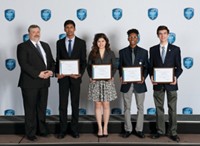Advertisement
Grab your lab coat. Let's get started
Welcome!
Welcome!
Create an account below to get 6 C&EN articles per month, receive newsletters and more - all free.
It seems this is your first time logging in online. Please enter the following information to continue.
As an ACS member you automatically get access to this site. All we need is few more details to create your reading experience.
Not you? Sign in with a different account.
Not you? Sign in with a different account.
ERROR 1
ERROR 1
ERROR 2
ERROR 2
ERROR 2
ERROR 2
ERROR 2
Password and Confirm password must match.
If you have an ACS member number, please enter it here so we can link this account to your membership. (optional)
ERROR 2
ACS values your privacy. By submitting your information, you are gaining access to C&EN and subscribing to our weekly newsletter. We use the information you provide to make your reading experience better, and we will never sell your data to third party members.
People
Chemistry Wins At Intel Science Talent Search
Science Fairs: Algal biofuels and other chemistry-related project earn top prizes for high school student competitors
by Linda Wang
March 18, 2013

Chemistry projects earned top honors for some of the participants in this year’s Intel Science Talent Search, which ended on March 12. Sara Volz, 17, of Colorado Springs, Colo., for example, won $100,000 for her research on algal biofuels.
The Intel competition recognizes high school seniors from around the U.S. who are conducting innovative research in science, technology, mathematics, and engineering. Volz and other winners were honored during an awards ceremony in Washington, D.C.
For her project, Volz used artificial selection to establish populations of algae cells with high oil content. She demonstrated that algae can be used as an economically feasible source of biofuel.
Volz grew algae in a medium containing the herbicide sethoxydim to kill algae cells with low levels of acetyl-CoA carboxylase (ACCase), an enzyme needed for lipid synthesis. Her analysis of the remaining algae cells revealed significant increases in lipid accumulation.
“This technique could be used to increase oil production of algae for large-scale production,” Volz says. “In the long-term, this could make algae biofuels sustainable. And maybe one day you could be putting algae biofuel into your car at the pump.”
Other chemistry-related projects include Jonah Kallenbach’s $75,000 second-place prize for designing a computer program that predicts how disordered proteins interact with ordered proteins in the body. The work has the potential to yield a new paradigm for drug design in which disordered regions can be used as promising new drug targets for diseases such as cancer and tuberculosis.
Kallenbach, a 17-year-old from Ambler, Pa., says the subject of his research hits close to home. “My mom has breast cancer, and three of my four grandparents have had cancer,” he says. “Any potential positive impact that I could have in the field of disease research would be incredibly rewarding.”
The $50,000 third-place prize in the Intel competition went to Adam Bowman, 17, of Brentwood, Tenn., for his design of an inexpensive low-energy pulsed plasma device. He says his work could open the door for plasma research to be conducted in small-scale operations, perhaps even in high school laboratories.
“I really enjoy the hands-on aspect of research more than anything else,” Bowman says. “Interacting with the apparatus, troubleshooting, and finding solutions all provide motivation and a special sense of satisfaction for me.”
All of the students who participated in the competition should consider themselves winners, notes Jeffrey I. Seeman of the University of Richmond and founder of the Archimedes Initiative, an effort to increase science literacy in the U.S. “It’s wonderful to identify and to celebrate the winners, but all kids who participate are winners because they all learn something, and they all advance their own knowledge and appreciation of science and the scientific method.”



Join the conversation
Contact the reporter
Submit a Letter to the Editor for publication
Engage with us on Twitter